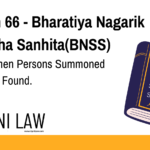Section 470 CrPC: Exclusion of Time in Certain Cases
This section deals with the exclusion of certain periods of time from the computation of the period of limitation for filing an appeal or application. This exclusion is intended to ensure fairness and prevent prejudice to the parties involved.
Explanation:
Section 470 CrPC states that when the time for appealing or applying for a remedy under the Code is limited, certain periods are excluded from the computation of the limitation period. These excluded periods include:
- The time during which any application for revision or review was pending before the High Court or the Supreme Court.
- The time during which the applicant was prevented by any cause beyond his control from making the application.
- The time spent in obtaining a copy of the judgment or order appealed against or the record of the case.
In essence, this provision ensures that a person is not penalized for delays caused by factors outside their control.
Illustration:
Imagine a situation where a person wants to appeal against a lower court’s order but faces delays in obtaining a copy of the judgment due to administrative issues. In such a case, Section 470 CrPC would exclude the time spent in obtaining the copy from the total limitation period for filing the appeal, ensuring the person has a fair opportunity to exercise their legal right.
Common Questions and Answers:
Q: What is the purpose of excluding time under Section 470?
A: The purpose is to ensure that the limitation period for filing an appeal or application is not unfairly shortened due to delays beyond the applicant’s control.
Q: Who can benefit from the exclusion of time under Section 470?
A: Any person who is filing an appeal or application and who has faced delays due to the causes mentioned in the section.
Q: What is the burden of proof for excluding time under Section 470?
A: The burden of proof lies on the person claiming the exclusion of time. They must demonstrate that the delay was due to one of the reasons mentioned in the section.






